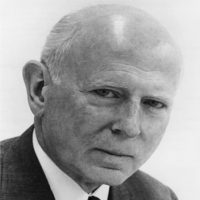
William F. Windle
New York University Medical Center
For basic discoveries in the field of developmental biology.
Professor Windle's pioneering research on the physiology of the embryo and the newborn has extended our knowledge of one of the major causes of cerebral palsy and intellectual disability in children, and has pointed the way to their prevention and therapy.
Through Dr. Windle's most recent investigations, new knowledge has been acquired of the relationship between changes in behavior and deterioration of the brain, which sheds new hope and light in providing treatment and rehabilitation for brain-damaged children.
Professor Windle discovered a consistent and precise pattern of brain damage following asphyxiation and resuscitation of the infant at birth. He found that this suffocation is a frequent cause of intellectual disability and cerebral palsy.
He and his colleagues were also the first to correlate this pathology with the clinical symptoms of cerebral palsy, and the first to associate it with the condition known as "kernicterus," in which specific centers of the brain are colored yellow.
Dr. Windle has made basic discoveries in the field of developmental biology, especially on the structure and function of embryos and newborn infants.
For these achievements and especially his contribution to improvements in the treatment of brain-damaged infants, so that congenital defects are less severe and more manageable, Dr. William Windle is given the 1968 Albert Lasker Award for Basic Medical Research.
